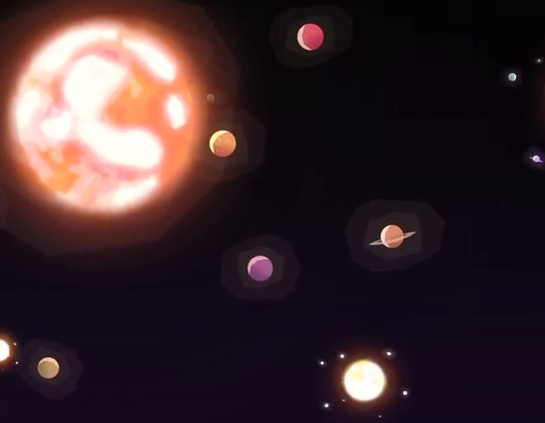This dark energy doesn't behave like any other substance we know at all and acts more like antigravity force.
這種暗能量的性質(zhì)與我們所熟知的其他物質(zhì)完全不同,它更像是反重力。
We say that it has a gravitational pressure, which ordinary matter and dark matter do not.
暗能量具有重力壓力,這是普通物質(zhì)和暗物質(zhì)所不具有的。
Instead of pulling the universe together, as we would expect gravity to do, the universe appears to be expanding apart at an ever-increasing rate.
宇宙并沒有因?yàn)橐Χ蛞黄鹁奂@與我們預(yù)想的不同,相反宇宙似乎是在不斷膨脹,并且這種膨脹還處于一種持續(xù)增長的速度。
The leading idea for dark energy is that it is a cosmological constant.
暗能量的主導(dǎo)觀點(diǎn)認(rèn)為它是一個(gè)宇宙常量。
That means it has the strange property that it expands as the volume of space increases to keep its energy density constant.
這意味著暗能量具有一種特殊屬性,它能夠使暗能量隨著宇宙體積的增長而擴(kuò)大,從而使其能量密度保持不變。
So, as the universe expands as it is doing right now, there will be more and more dark energy.
因此,隨著宇宙不斷膨脹,正如此時(shí)此刻,暗能量也會(huì)隨之不斷增長。

Dark matter and baryonic matter, on the other hand, don't expand with the universe and become more diluted.
然而暗物質(zhì)和重子物質(zhì),從另一方面來看,則不會(huì)隨宇宙而增長,他們反而會(huì)不斷減弱。
Because of this property of the cosmological constant, the future universe will be more and more dominated by dark energy, becoming colder and colder and expanding faster and faster.
因此,由于宇宙常量所具有的性質(zhì),未來的宇宙中將會(huì)充斥更多的暗能量,宇宙將會(huì)變得越來越冷,其膨脹速度也會(huì)越來越快。
Eventually, the universe will run out of gas to form stars, and the stars themselves will run out of fuel and burn out, leaving the universe with only black holes in it.
最終,宇宙將會(huì)由于缺少氣體而無法形成恒星,同時(shí)恒星自身也會(huì)燃燒殆盡,宇宙中留下的只會(huì)是一個(gè)個(gè)黑洞。
Given enough time, even these black holes will evaporate, leaving a universe that is completely cold and empty.
如果經(jīng)歷足夠的時(shí)間,這些黑洞甚至也會(huì)消失,那時(shí)宇宙將會(huì)是一片寒冷空虛。
That is what we call the heat death of the universe.
那就是我們所說的宇宙熱寂說。
While it might sound depressing living in a universe that will end its lifetime cold and devoid of life, the end fate of our universe actually has a beautiful symmetry to its hot, fiery beginning.
盡管這聽起來讓人覺得生活在宇宙中十分沮喪,因?yàn)樗鼘⒃诤浜土藷o生氣中走向滅亡,但宇宙冰冷的終結(jié)卻完美地與其火熱的發(fā)端相稱。
We call the accelerating end state of the universe a de Sitter phase, named after the Dutch mathematician Willem de Sitter.
我們稱宇宙加速的終結(jié)狀態(tài)為德西特階段,這是根據(jù)荷蘭數(shù)學(xué)家威廉·德西特命名的。
However, we also believe that the universe had another phase of de Sitter expansion in the earliest times of its life.
然而,我們也相信宇宙還存在另一個(gè)德西特膨脹階段,它發(fā)生在宇宙形成的初期。
We call this early period inflation, where, shortly after the Big Bang, the universe expanded extremely fast for a brief period.
我們稱其為早期膨脹階段,那是大爆炸后,宇宙急速膨脹的短暫時(shí)期。
So, the universe will end in much the same state as it began, accelerating.
因此宇宙將會(huì)以其產(chǎn)生、加速時(shí)的相同狀態(tài)結(jié)束。
We live at an extraordinary time in the life of the universe where we can start to understand the universe's journey and view a history that plays itself out on the sky for all of us to see.
我們生活在一個(gè)對(duì)于宇宙生命來講意義非凡的時(shí)代,我們能夠去了解宇宙的歷程,同時(shí)也能夠去了解它那呈現(xiàn)在天空中,為我們每個(gè)人所展示的歷史。


